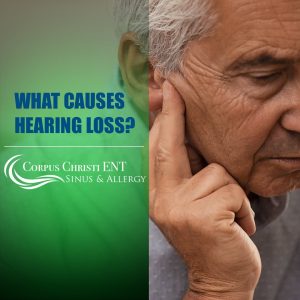 Hearing loss can be caused by many things. Some are preventable, some are not. Here we will briefly look at some of the most common causes of hearing loss.
Hearing loss can be caused by many things. Some are preventable, some are not. Here we will briefly look at some of the most common causes of hearing loss.
Age-related hearing loss
Also known as Presbycusis, hearing loss due to aging is the third most common chronic health complaint among older adults. Just as we find our knees or hips deteriorating, our ears also “wear out”. The ears age as we do and don’t function as well as they did when we were younger. Age related hearing losses occur gradually over time. In women they typically start to be noticed in the 60s while in men hearing loss can start to be noticeable in the 50s. However, everyone is different and there are a lot of factors that can impact how quickly a hearing loss can develop. For example, the rest of the items on our list can all cause an age-related hearing loss to occur sooner or be more significant that it would be if it was happening on its own.
Noise exposure
There are two types of noise exposure, sustained and acoustic trauma. Sustained noise exposure is the type that people who work at factories or around loud constant or consistent noise experience. Acoustic trauma is am extremely loud, but brief blast of sound like a gun shot or blast from an air horn. Both are dangerous, but in slightly different ways. The ear has a protective reflex that protects us from some damage from noise exposure. But it doesn’t work for acoustic trauma. In the case of acoustic trauma the noise burst is so loud and usually so brief, the protective reflex doesn’t even have a chance to kick in before the noise is gone. So the damage has already been done. It only takes one time to cause some loss. In the case of sustained noise exposure, we often will experience temporary shifts in our hearing that can return back to normal. However, repeated exposure to sustained loud sounds will eventually result in a permanent loss of hearing. The use of appropriate hearing protection when exposed to loud sounds can go a long way towards preventing hearing loss due to noise exposure.
Ototoxicity
Ototoxicity is a fancy way of saying medications that poison the ear. There are many known medications that may have a side effect of causing hearing loss. These medications are typically only used in extreme circumstances. When they do have to be used, the patient may be asked to have a baseline hearing test and then routine tests while they are taking the medication so that the physician can judge when the benefit of the medication is overruled by the disadvantages of it. Some examples of known ototoxic medications would include cisplatin-based chemotherapy drugs, quinine, loop diuretics, and -mycin antibiotics given through an IV. The medication is being given for a reason, to help the person get better. Luckily, these medications are not given very often anymore.
Family inheritance/genetics
There are hearing losses that can be inherited from our family members or that can be caused by genetic defects. Just as you can inherit your dad’s brown eyes or your mother’s blond hair, or Uncle Jim’s hooked nose, you can inherit a hearing loss. Some losses would be congenital, meaning present at birth, while others may not present until later in life. There are some syndromes that also have hearing loss as one of the symptoms or characteristics. We can’t always predict who will inherit a hearing loss or not. In cases where the likelihood is high we would monitor the individual over time for signs of loss.
Disease/illnesses
There are several diseases and illnesses that can result in a loss of hearing. Some of these losses may be only temporary, like when you have an ear infection. Other losses may be permanent. There is a strong link for example, between Diabetes and hearing loss. There are documented cases of hearing loss due to Scarlet Fever, Measles/Mumps/Rubella, Malaria, Bacterial Meningitis, and Autoimmune Diseases. Hearing loss does not always occur with these illnesses and may vary in severity. Once the individual recovers adequately from their illness and are capable of participating, a hearing test would be a good idea.
This is not a comprehensive list by any means. There are many different causes of hearing loss. If you feel that you are having trouble with your hearing, call our office today and schedule a hearing test with our Audiologist.